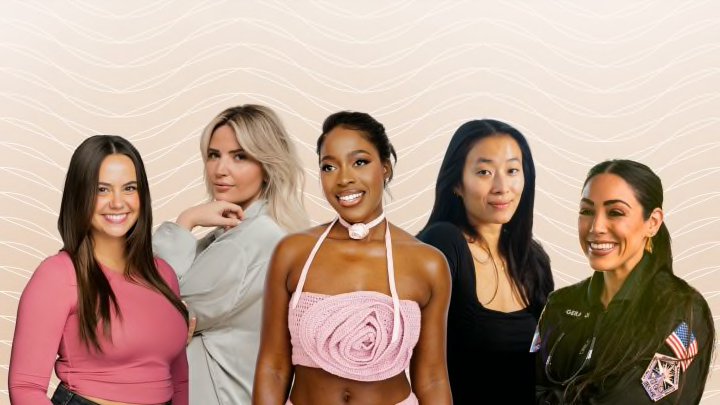How These Online Creators Turned Content Into Meaningful Community

In celebrating our 60th anniversary this year, we’ve been reminded of the importance of community. Whether fostering new and old connections at the Legends photo shoot in Hollywood, Fla., reconnecting on the red carpet at the magazine’s launch events in New York City or watching the seven 2023 Swim Search co-winners thrive as a unit, it’s all about community here at SI Swimsuit.
Connection is integral to us as a brand, and it’s something that we all seek out in our daily lives through friendships, family relationships and even on social media. And when it comes to the latter, it has been proven time and time again that authenticity over perfection is what matters.
Creating a personal brand online takes grit, determination and a strong sense of self. The following creators possess all of those qualities (and more), which is why they impress us so much. These women are not only leaders in their respective fields, but also they are shining examples of what it takes to foster genuine connection through online spaces. Whether they’re innovating with the products they create, encouraging young girls to pursue careers in STEM or leading the helm of operations as CEO, they all have one major thing in common: They understand the power of community.
Creating meaningful change through representation
Kellie Gerardi’s innovation in STEM and beyond
When she became the 90th woman in history to fly to space last year, Kellie Gerardi adorned her wrists with stacks of beaded friendship bracelets in an homage to girl power.
“It was really important to me to not tone down my personality or femininity in an attempt to match a picture of what someone else thought a woman in STEM should look like,” Gerardi says. “I wanted to bring my full self to space and show my daughter that being yourself is always enough.”
Over the years, Gerardi has built an online science communication platform that informs and educates, whether she’s sharing clips from outer space or keeping it real about motherhood.
“I think my journey resonates with people because the most extraordinary thing about me is that I’m an ordinary person. And that kind of visible representation matters,” she notes. “I share my life and journey on social media because it spells out a new path for a new generation, and it puts a name and a face to a story and a dream.”
Representation is hugely important to Gerardi’s mission, and she’s proud to be an example of how women can have career aspirations and personal passions outside of motherhood. Gerardi, who is the author of the children’s book series Luna Muna, says that her community is actively helping her to build a better and brighter future for the next generation of STEM enthusiasts.
“It's a community that I consider myself to be a part of, not a leader of, and I truly believe you get out what you put in,” she states.
Fashion and representation
Breaking barriers with Nana Agyemang
Nana Agyemang also knows how important representation is within a community. She launched EveryStylishGirl, a platform dedicated to connecting Black and Brown women with career opportunities within fashion media when she was still in college. Years later, when she accepted a fashion internship out of college, she found she was one of few Black women employed by the publication. To create space for her peers, Agyemang focused on growing her platform and started a media training program to coach minority women who wanted to break into the fashion industry.
“When it comes to content, it needs to evoke emotion, empowerment or education,” Agyemang says. “We know what our followers are going through because I am the follower … At the end of the day, it's about being personable.”
While working as a contributing social editor for The Cut, Agyemang found that incorporating her personality into the brand’s voice allowed for major performance growth.
“I would speak in first person and I would post photos of Black women and nostalgic images of Black women with certain hairstyles … And I remember being trolled in the comments because people were like, ‘This is racist,’ but they didn't realize who I was,” she notes. “So I had to introduce myself … and say, ‘Hey, I'm a Black woman here.’ Or sometimes I would sign off on the caption: ‘From your Black editor.’ I really was pronouncing myself and I was making it known. My purpose in life is giving a voice to the voiceless, and I think for so long, Black women felt like we needed to hide in the shadows.”
By making her identity known, the community was able to powerfully expand and diversify. Agyemang’s community-building method took The Cut from 500,000 Instagram followers to one million in a year.
Uplifting women through content creation
How Sarah Nicole Landry turned isolation into empowerment
In 2008, Sarah Nicole Landry found herself feeling incredibly isolated. The stay-at-home mom had just moved far away from her hometown and felt disconnected from her peers. In an effort to connect and form an identity outside of her role as mother, Landry learned how to code, outsourced a logo for $25 and The Birds Papaya was born.
What started as a craft blog soon shifted to an Instagram presence, where Landry famously documented her weight loss journey. With it, she described feeling more anxious and sadness around her body than ever before, which caused her to change how she showed up for her followers. Rather than sharing curated images, she decided to embrace her authenticity. Whether championing stretch marks or cellulite, Landry shares real moments that others often try to hide.
“I started shifting what I was consuming and shifting what I was posting and not in a perfect way, but in a messy, real way,” Landry says. “That ended up being what connected me the most with people, just sharing in the rawness of what I was going through and connecting with other people who have maybe gone through the same.”
How Spencer Barbosa champions authenticity
Known for her relatable content on TikTok, Spencer Barbosa has become a beacon of positivity and authenticity. You’ve likely seen Barbosa’s videos while scrolling on TikTok, where she shares relatable body content and messages of self-love with her millions of followers.
Barbosa says she’s able to maintain such an authentic presence online thanks, in part, to the community of “besties” she’s cultivated. Her positive, uplifting following is a reflection of the vulnerable content that she regularly shares.
“I think me and my community bonded because I struggle with a lot of the things they also struggle with,” Barbosa says. “My whole life I thought I was the only girl with back hair so I got vulnerable and posted a video about it. I quickly learned millions of girls felt the same way … There is something so beautiful about being so real and raw. It’s scary to be vulnerable but it's also so freeing.”
Fostering community IRL
Nadya Okamoto’s nationwide community building
Ten years ago, Nadya Okamoto used Facebook and Instagram for grassroots organization of the nonprofit she cofounded, period.org. Four years later, the social entrepreneur published her first book, Period Power: A Manifesto for the Menstrual Movement, and in 2020, Okamoto launched August, a lifestyle brand dedicated to fighting the stigma around periods.Today, she is currently on a cross-country road trip in which she’s meeting many of her near five million social media followers in real life. Thus far, her community-building efforts have taken her everywhere from Oregon to Tennessee.
“I started August during the pandemic in my junior year of college, and that was when everybody was feeling really lonely, we were craving more online community,” Okamoto explains. “[When] we launched the company, I started posting about it on TikTok. Within six months, I had a million followers. We started posting [on our community], ‘Hey, anybody in New York, come meet up.’”
Her cross-country tour is an expansion of those initial meetups. Okamoto posts where she’ll be on TikTok and encourages her fans to come meet her.
“Community is when everyone has a microphone, or a group of people do, and they’re all speaking and then my job [online] is holding the space for them to have that conversation and do more listening.”
How Lucy Osinski is building GRLSWIRL from the ground up
The concept of connecting in-person is one Lucy Osinski can deeply relate to. Upon moving to Los Angeles several years ago, Osinski was searching for connection—and she found it in an unexpected place. After her boyfriend taught her to skateboard, the former professional ballerina felt an immediate sense of identity and direction.
Soon after, Osinski began “chasing down” any girl she saw on a skateboard. She created a text chain among the first group of women she met, and GRLSWIRL, a community-first women’s skate collective, was born.
“It was definitely a big moment and I would say the core of GRLSWIRL started from that day, the fabric of everything around our movement of empowering people through skateboarding,” Osinski says of that initial meetup. “From that first moment, we looked around and it felt electric, we felt safe and we felt celebrated.”
What began with nine women in Venice, Calif., eventually expanded globally, and six years in, there are seven different Swirl chapters worldwide. The brand’s mentorship programs have taught more than 500 children how to skate, while the collective has also raised significant funds for local shelters.
“Everything is community first,” Osinksi says. “The goal is to give people what we all got that first night, which was a sense of connection and comfort. I think at the end of the day, we’re all searching for community, and GRLSWIRL provides that through skateboarding.”
These six women continue to illustrate what it means to foster a sense of community—both online and in person—that has an everlasting impact. All the while, they’re reminding us all of an incredibly important message: that we all deserve to feel like we belong.
